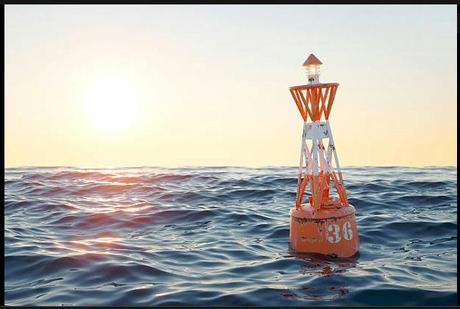The derivation of flamboyant is the French flamboyer meaning to flame, to flash, to shine. Yes it gets applied as an adjective to anyone or anything "showy" (animals. architecture, clothes, Eurovision, flowers, influencers, models and popular music divas), but add a 'u' in the appropriate place and you get flambuoyant. Voila! I give you the light buoy. It floats as it shines as it warns. (I'm so pleased I never took that job in advertising.)

a light buoy ready for the night's work
Light buoys primarily act as a navigational aid at night. They are usually anchored in shallow waters to warn of dangerous rocks , sunken wrecks, or to mark out channels to sail through in the dark. Originally the lights would literally have been flames (coal or wood in a floating brazier). These were superseded by candles, then battery-powered lamps and nowadays they are often solar-powered affairs.They are in practice (despite my humorous wordplay) the very antithesis of flamboyant, being plain and serviceable structures, but absolutely vital to safe shipping in tricky waters.
What's more, I can't even claim any credit for the contraction of the words flamboyant and buoyancy that result in flambuoyant. It's been a member of the urban dictionary for quite some time as: "a description of a body's tendency to float as a result of vivid or over-the-top mannerisms and/or swim apparel".
However, my meticulous research did lead me to the wonderful Pfeffer's Cuttlefish (sometimes actually called the Flamboyant Cuttlefish), which graces the warm waters off the northern coast of Australia.

the Eurovision of cuttlefish
It's a tiny creature (the size of a coin) and a poor swimmer, preferring to move ungainly across the seabed, "like a dog in a wheelchair". Note well that it's also poisonous if eaten (even with chips and gravy).To round out this Saturday's ramblings on things flambuoyant, mention must be made of those cunning Byzantines who from the 6th century onwards used fireships to devastating effect against the Turkish enemy in their naval wars in the Aegean and eastern Mediterranean. Over a thousand years before the English Navy tried sending unmanned flaming ships filled with explosives in amongst the boats of the Spanish Armada in an attempt to set the enemy fleet on fire (a plan which failed to succeed, by the way), the Byzantine navy had perfected the art of using fire, that gift of the gods, at sea.

temporary like Prometheus
The specialized Byzantine fireships known as dromons were manned and thus manoeuvrable, able to get up close to the enemy and then unleash 'Greek Fire' on the target via a flamethrower. The recipe for 'Greek Fire' was a closely guarded state secret but was believed to be composed of a mixture of pine resin, naphtha, quicklime, calcium phosphide and sulfur. It was heated and pressurized in containers on board the dromons and then delivered flaming using a siphon and funnel onto the target, adhering to and burning everything it touched - much like modern napalm. Unsurprisingly, it was a fearful and much feared weapon delivery system in the armoury of the Byzantine navy. I'll leave it there.To conclude, another work-in-progress from the imaginarium. Make of it what you will. I'll take it to the Blackpool & Fylde Stanza group for their considered input
Greek FireDona Ferentes in a different age might have found fame as a culinary sage:How to roast a whole bull on the shore,Mouth-watering meals for Moors,Sarcen pie with village greens,Ambrosia pudding for vestal teensor 101 things you can cover in honey - but
there were no Saturday Celebrity TV Cooksand no Sunday Supplement recipe books,(for the printing-press was not yet invented)so even if being a woman and half-casteand a Spanish witch hadn't killed her career before it was born, she would have struggledto make a name for herself - plusher best recipe, the one that might haveearned a wage, was top-secret by Order of The State, known only to a few on a strictly need-to-know basis, meaning she got little credit in her lifetime and died,dark tar in her soul, a disregarded Danaandowager in a cypress grove grave - thoughthe fearful sticky sauce the Dona devisedfor dromons to spray on their adversaries,frittering Arabs and Turks on the middle seafrom Carthage to Canaan, stood satisfaction of sorts, vengeance in perpetuity for the ireshe nursed against those who razed homes,killed parents, stole childhoods - worse.
Thanks for reading, S ;-)
